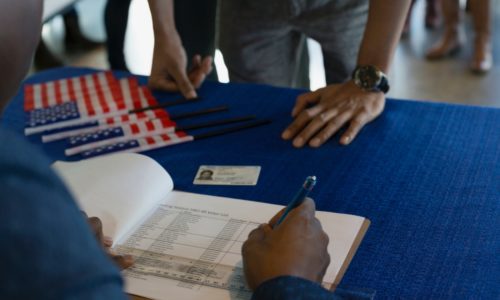Voter Registration Is Inherently Racist
Share
Explore Our Galleries
Breaking News!
Today's news and culture by Black and other reporters in the Black and mainstream media.
Ways to Support ABHM?
By Chris Winters, yesmagazine.org
And several other reasons that the midterm elections are testing how far some states can go in disenfranchising certain voters.

What if we had an election and everyone came?
That’s not a hypothetical question, because we’re right now in the middle of the midterm election season where one of the two political parties is trying to make sure fewer people are going to vote.
Midterms are said to be a referendum on the incumbent president, but probably nothing is more at stake than elections for state legislatures. Whoever controls the state houses in 2018 will be in charge of redistricting after the 2020 Census—and that happens before the 2020 presidential election, when President Trump actually will be on the ballot.
The fact that, according to Cook Political Report, as of Oct. 12, 327 out of 435 House of Representatives seats are considered locks by one of the two big parties points to how antidemocratic the whole system has become.

Turnout in midterms is historically low, but there are signs that this year might be different. Pew Research saw a surge of voting in the primaries by more than 50 percent over the 2014 midterms. Call it the Trump Effect, or call it something else, these midterms are shaping up to be one of those turning points that determine the direction of the nation for decades to come.
Turnout in midterms is historically low, but there are signs that this year might be different. Pew Research saw a surge of voting in the primaries by more than 50 percent over the 2014 midterms. Call it the Trump Effect, or call it something else, these midterms are shaping up to be one of those turning points that determine the direction of the nation for decades to come…
Read the full article here
Read more about voter disenfranchisement here









Comments Are Welcome
Note: We moderate submissions in order to create a space for meaningful dialogue, a space where museum visitors – adults and youth –– can exchange informed, thoughtful, and relevant comments that add value to our exhibits.
Racial slurs, personal attacks, obscenity, profanity, and SHOUTING do not meet the above standard. Such comments are posted in the exhibit Hateful Speech. Commercial promotions, impersonations, and incoherent comments likewise fail to meet our goals, so will not be posted. Submissions longer than 120 words will be shortened.
See our full Comments Policy here.